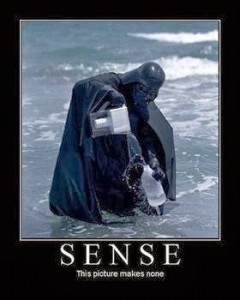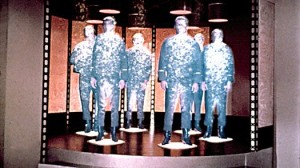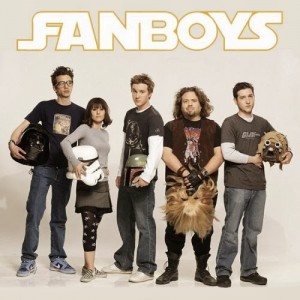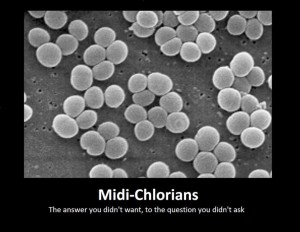In the spirit of NaNoWriMo, I’ve begun sharing what I’ve learned while tackling my first two novels. And, while you may not be reading this back in November, I figure it’ll still be helpful whenever you are looking this way. Last week I addressed Mystery. But the fact is that Mystery isn’t the only genre present in those two novels. Anyone who has read my novels will know that they’re something of a genre mash-up. Though they’re primarily crime novels centering on murders and conspiracies, they’re also very focused on Fantasy and Science Fiction.
To me, the combination is natural. As Arthur C Clarke once said, any sufficiently advanced science will appear to be magic. So the reverse would be true as well, any magical thing could probably be explained via science. It’s because of this that I felt it was easy to take creatures such as werewolves and vampires and use the odd quirks of biology to explain some of their traits. In my eyes this makes them more fantastic because it makes it plausible that they could exist in the same world we do.
So when I once heard from agents and publishers that the weakest link of Science Fiction was the “science” part I started a series of posts devoted to the genre. But I’m not so blindly devoted to Sci-fi that I believe it can do no wrong. Science Fiction has produced some incredibly bad works for a variety of reasons. In the end, I think it has more to do with how writers approach the genre than it has to do with the genre itself. And so, in an effort to improve the future of Sci-Fi, I now lay down some helpful advice for those of you just starting to step into that world of endless possibilities.
1. Don’t Forget You’re The Author, Not The Fan
One of the chief problems with a lot of first time sci-fi is that many who write these stories actually started out as fans and have a hard time dividing their fandom from their creation. It’s important for a person to find their own voice and that means that they have to have the ability to separate themselves from what they’ve loved. There’s a couple of ways this attachment to fandom can manifest itself and it’s rarely good for your story.
The most common variation of becoming too attached to the fandom is the fear of walking away from the tried and true. This leads to the infamous industry stagnation that so many people have talked about in the past. It’s understandable, a lot of people started out loving a franchise and then loving the genre. So when they’ve dreamed of writing for that particular property, it sometimes bleeds through into their work. But you want to avoid your creation being so close to what you loved that it becomes a fan-fiction rather than a unique creation.
For instance, it’s perfectly okay to feature something like warp-drive in your story. You can even have aliens who are vaguely human populating your universe. But when you take the two of those and then you start to represent these human-like aliens with warp drive being part of a federation of planets… you may have started a fan-fiction.
 |
| Just like JJ Abrams |
In the end, just be honest with yourself. When you see something on the page that might have come from another place, ask yourself: Is this who I am or is this just what I’ve seen before? If it’s part of who you are, leave it. But if you feel that it’s something you’ve put there just because that’s what you’re familiar with, it’s a good idea to come up with something different. Don’t reject something just because it was inspired by someone else, but don’t duplicate those people out of fear. When you find your own voice, you’ll find you like the results better anyway.
2. The Story Is More Important Than Your Concept
 |
| See? Not enough to just have a concept. |
One of the greatest dangers of the Science Fiction genre is how easy it is for your story to follow the concept rather than be supported by it. If you were to look at the back cover of any Science Fiction novel, you’d be able to see what the basic concept is rather quickly. The problem is, for many, that a lot of these stories stop at the concept and forget to fill in the rest.
This can manifest when your story is high on concept but thin on plot. You’ve spent so much of your time looking at the big ideas that you forgot the majority of the story’s charm is going to be in the small things that happen in between those big events. Once you have the big ideas in place, those ideas have to be conveyed to the reader by the characters experiencing it. You’re always going to need to remember the human element.
One of the ways to make sure that your story is something that could work is to try summarizing it to yourself while swapping out your big idea for something a little more mundane. For instance, if your story of traveling via starship would be just as interesting if traveling by boat then it’s probably a story that will reach the audience regardless. If you could swap “Robots” for some subset of the human race then your story can reach the audience as well. And if you could change “Mutants” for “Minorities” then you’ve written X-Men and I thank you for coming to my page, Stan.
The point is, while it’s important to have big ideas in your Science Fiction, it shouldn’t become dominated by them. Your audience is going to need to understand the story you’re telling on some level and, since most of them aren’t going to be PhDs, that’s going to require they understand the human part of it. You’ll find you connect with it better yourself too as you make it more relatable.
3. Handwavium
So you’ve got a rich cast and you’re forging your own path. But how exactly do you go about explaining the science in your fiction? Very rarely do you have theoretical physicists writing novels. The solution for most is “Handwavium”. Through the use of “Handwavium” you can “handwave” the problem “away” so you don’t have to “deal with it”. In nerd terms, you’re trying to Jedi mind-trick your audience into looking past the hole in your science.
But what exactly is Handwavium and how do you go about using it correctly?
Handwavium is when the writer coins a term or creates an element of the plot that patches the holes in the science or fixes a problem without really explaining them. For instance, one of the most famous Handwaviums is Star Trek’s transporters. While scientists have long chased after the concept and have found some theories for how it would work, in the end the transporters were just a quick way of making the cast move from one location to another without having to show them walking, flying or using the rest of the budget. In a simple 60s special effect technique they were able to just handwave away part of the problems in producing a TV show about space travel.
 |
| Watch our problems disappear |
But you must be incredibly careful with the use of Handwavium. Sometimes people use it too much and they will ward off audiences by either sounding convoluted or, worse, like complete bullshit. So here are some simple rules for its use:
A) Never create a new explanation for something that already exists. If you want to form a story around something that’s already explained by science it’s usually a good idea to read about what science has said on the subject before you go changing it. No one is going to buy it when you say that stars are actually the plasma that escapes from a second dimension consisting entirely of plasma. Though, if you do make this story, it would totally work in a Fantasy mash-up (more on that next week).
B) Never draw too much attention to your Handwavium. If you do have something like transporters, then it’s best not to make the story about that one element. Sure, there were a lot of episodes of Star Trek that centered on the idea that the transporter malfunctioned. But if you look too closely at the concept of transporters you start to see some really big plot holes in the stories. For instance: if it’s possible for two people to be accidentally merged, why has it taken a couple hundred years for this accident to occur?
C) Never compound your Handwavium by trying to explain it with even more Handwavium. There’s a line that will set off bullshit alarms in the reader once you cross it. The level of Handwavium that you’re allowed changes depending on the audience. Star Trek has a pretty high Handwavium threshold. Star Wars, funny enough, actually has a fairly low Handwavium threshold. Sound strange? Well consider how the fans reacted when “The Force” was explained by “Midichlorians”.
4. Unobtainium
Another term often thrown around and having a similar function to Handwavium is Unobtainium. A lot of people will even tell you that these terms are completely interchangeable. But when you take a look at the history of these words you find they’re very different things filling a similar function. You see, while Handwavium focuses on making you ignore the science, Unobtainium is usually a viable explanation for the science that is either too hard to get or is still just theory.
Unobtainium can fill in a lot of holes that scientists have been trying to fill in for years. One of the most famous examples of Unobtainium is Antimatter. While Antimatter is capable of solving just about all of the world’s energy problems overnight, it comes with the burden of being nearly impossible to produce to the point that it is actually currently the most expensive material on the planet. So when you have a starship powered by Antimatter, it’s entirely plausible but unobtainable by today’s standards.
Unobtainium is one of the most useful things to Science Fiction writers and, if you ever have a choice between Handwavium and Unobtainium, it’s recommended to use the Unobtainium whenever possible. Not only does it come with the bonus of giving your story some credibility when people might have heard of the material you’re talking about, it’s also less high maintenance. Handwavium will require you to either work around it or address the questions about it almost constantly. Unobtainium, on the other hand, comes with the benefit of not having to always explain it because if your reader becomes curious they can look it up.
But on that end, one thing you have to remember when dealing with Unobtainium is that you should really avoid ever actually calling it “Unobtainium” in your story. This is a red flag for Science Fiction audiences that there’s a damn good chance you either don’t know what you’re talking about or you’re actually using the term to cover your handwave. This leads to one of the other big hang-ups for Science Fiction writers…
5. Know The Difference
A lot of you have probably heard the term “Unobtainium” before and recognized it as the material they were looking for in Avatar. However, as I said earlier, if you encounter the word “Unobtainium” in a story it’s almost universally Handwavium in disguise. There’s never been a theory for a material that could make entire islands float through the air and considering how little we actually learned of it, it was also a McGuffin to stand in for gold in the metaphor of the Europeans meeting with the Native Americans.
But that’s not a crime in itself, Handwavium has its place in the world of Science Fiction and the people behind Avatar actually made good use of it. What is a problem is when people don’t know the difference and treat both concepts exactly the same way. The two of them have different requirements even if they fill the same need and this can impact the quality of your story. So, here’s a couple rules to keep it straight in your head so you make sure you deal with it in the right way.
A) If you can look up the stuff you’re talking about in a scientific journal, news website or even wiki of all places: it’s Unobtainium.
B) If you can’t find the stuff you’re talking about in those sources, but you can find theoretical ideas that there may be something in the world that can do what you’re talking about: it’s also Unobtainium.
C) If you cannot find any reference to either the material or the idea that you’re writing in your story: it’s Handwavium.
Simple enough, right? But it’s vital to the quality of your story that you take a moment to figure out what you’re dealing with so that you know how to make it seamless with your world. If used right, your reader won’t be able to tell which is which, if used wrong:
Those hands can wave like a hummingbird’s wings.












Clarke’s saying is:
“Any sufficiently advanced technology is indistinguishable from magic.”
But what did he mean by that? That technology is magic to anyone that does understand it? Or those who do not understand it and are in awe of it? How many people understand their smartphones? Are we living with magic but take it for granted?
Clarke’s law relates to the idea that humans often see miracles when we don’t understand the actual process. We know today that lightning is generated by a complex and massive process powered by natural forces, but once upon a time we saw it as the work of the likes of Thor and Zeus. Similarly, if you were to have the chance to show your smartphone to someone completely removed from the modern world (such as the Sentinelese people south of India, who have been isolated for the most part for 60,000 years), they would be shocked by what you’re capable of doing with that little flat box. Is the cellphone magic? No. But as far as they know, it may as well be.
So Clarke posited that far-flung future technologies would be much the same to us – we would be in complete awe of how they worked and think of them as miraculous until we understood their function. Teleportation, telepathy, faster than light travel to name just a few.